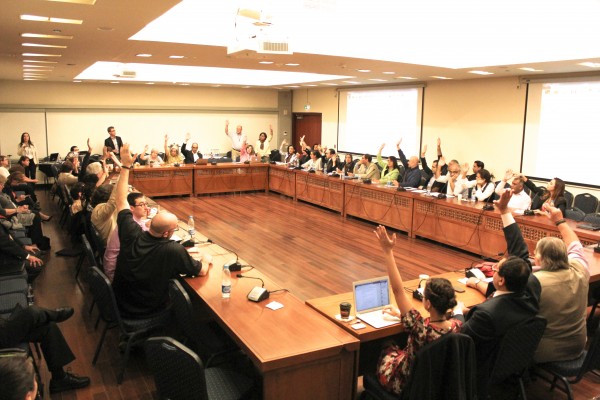The Mighty United Nations: A Platform for Interstate Bullying?
Some countries have accused the United Nations of bullying by dictating socio-economic and political policy. This has been a matter of debate for years, particularly in international relations theory and practice.
Can international organizations function based on principles of egalitarian transactions, providing for indiscriminate relationships, or do some use their power to bully others?
“It is a qualified yes,” says Professor of Political Science and History Ashraf El Sherif. “International organizations serve in favor of the powerful,” he added.
“Certainly one country does not count as one vote. They are not equal. The UN is equal on paper in the General Assembly, but not in the Security Council. In reality, it all depends on the real vested interests of the superpowers,” added El Sherif.
Political Science Professor Noha Bakr traces the emergence of the superpowers and their asserted right to the veto power during the founding days of the UN itself.
“Winners of WWII [established] the UN with the intention of recompensing themselves for winning the war. In other words, the winner takes all,” Bakr explained.
This is evident in how the Security Council is structured with the winners having permanent seats, as well as procuring the veto right. “One veto can lump any resolution,” Bakr added.
Nevertheless, the United Nations continues to be vital regardless of its decreasing efficiency and the US dominance over it together with the other superpowers.
“The UN procured its significance in its efforts in tackling security challenges that are tackled by the Economic and Social Council, as well as its role in the prevention of conflict through the International Court of Justice, with its compulsory verdicts,” Bakr added.
It may seem as if the cards are stacked against weaker and less developed countries.
But there is also a margin for the weak to argue for their causes, and this counts politically, if not in the short run, then definitely in the long run, El Sherif says.
This helps maintain a needed veneer of international legitimacy and legality.
But this facade quickly fade when it comes to the 70-year Israeli-Palestinian conflict.
Here, the balance of power is in favor of Israel, be it militarily, politically, economically or having the support of the superpowers.
“The UN efficiency is sort of hindered by the unilateral approach of the major superpower the United States, the highest sharing payer in the UN budget,” Bakr said.
In late December 2017, US President Donald Trump threatened to cut aid to UN member states who would vote against the US at the UN General Assembly on the issue of the declaration of Jerusalem the capital of Israel.
“They take hundreds of millions of dollars and even billions of dollars, and then they vote against us. Well, we’re watching those votes. Let them vote against us. We’ll save a lot. We don’t care,” Trump told reporters late December 2017.
Trump consequently drew international condemnation and stirred protests from Muslims worldwide, and was ultimately called the world bully.
US envoy to the UN Nikki Haley later sent a warning letter to the member states, saying Trump will take the voting choices on his landmark Jerusalem decision “personally.”
“The President will be watching this vote carefully and has requested I report back on those who voted against us,” Haley stated in the letter.
Haley added after vetoing a resolution condemning Trump’s Jerusalem move that the unanimous support for the resolution in the security council was an “insult” for the US, and that it “won’t be forgotten.”
The US was the only state of the 15-member council to oppose the resolution.
In September 2018, Iranian Foreign Minister Mohammad Javad Zarif accused Trump of attempting to commandeer the United Nations Security Council for the purposes of “bullying others” to turn against Tehran.
With the United States now holding the presidency of the Security Council, Haley said the aim was to put further pressure on Tehran over its alleged violations of council resolutions.
Trump boasted about how he has advanced the agenda that he calls America First.
“We reject the ideology of globalism, and we embrace the doctrine of patriotism,” he said.
Trump believes members of the UN should work together only when their interests are in sync.
It is clear that if the United States isn’t willing to act, nobody else would. The bullies of the UN would triumph.
“Might does not make a right, even if it’s a super mighty power. One state can steal, but then again, will that not be their point of weakness? One day, Israel, for instance, will fall because of just this. Its illegitimacy.” commented El Sherif.




